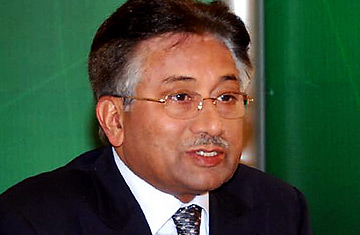
Pakistani President Pervez Musharraf on January 3, 2008
(2 of 2)
Musharraf said that elections, which he assured journalists would be free and fair, would bring stability to Pakistan. But in the current environment, fraught with fears of terrorism and suspicion of the ruling party, it is hard to see how elections will go forward in a transparent and convincing manner. Rallies are the cornerstone of Pakistani politicking. Only an estimated third of the population has access to television, and half are illiterate, making personal appearances essential to gain votes. Accusations are rife that the polls will be rigged — Bhutto was planning to present investigative documents detailing government plans for skewing the vote in its favor when she died. Nobody was expecting Musharraf's Pakistan Muslim League-Qaid (PML-Q) to receive a landslide; rather, Bhutto's report suggested, rigging would ensure that the government party would simply get enough votes to retain a majority in parliament. Analysts predict that if polls are indeed conducted with no manipulation, Bhutto's PPP will gain the most votes, followed by rival and former Prime Minister Nawaz Sharif's Pakistan Muslim League-Nawaz (PML-N), and finally Musharraf's party. If PPP and PML-N form a coalition under those circumstances, they could have enough of a majority to force Musharraf from power. That risk alone is what drives the persistent rumors that Musharraf has no choice but to rig the elections in his party's favor.
Over the past year, Musharraf has shown a remarkable resilience, defying predictions that he would be either assassinated or that the multiple crises forcing his popularity downward would finish him off. But at what cost? His artful dodger tactics may have kept him in power, but in doing so he has squandered his earlier legacy of cleaning up government, building infrastructure and improving the economy. While he still imagines himself the savior of Pakistan, few Pakistanis see it that way.
Calls are growing for Musharraf to rescue his nation by sacrificing his own political future. International think tank Crisis Group, never a friend to Musharraf, has taken its strongest stand against him yet, recommending in a new report that in order to ensure a more stable Pakistan the former military general step down immediately. "It is time to recognize that democracy, not an artificially propped-up, defrocked, widely despised general — has the best chance to provide stability and turn back extremists' gains," wrote Robert Templer, Crisis Group's Asia Program Director. The government, as expected, responded vociferously, saying that the report "badly lacks appreciation and knowledge of the environment and conditions prevailing in Pakistan" — ignoring the fact that ICG has had a presence in Pakistan for several years.
ICG is hardly the first to urge Musharraf to step down. For the past several months newspaper columnists, civil society representatives and even former military personnel have asked him to do so, saying that a graceful resignation by Musharraf would usher in true democratic change, thus ensuring him a powerful legacy. By staying in power through a flawed — some say unconstitutional — presidential election, Musharraf has lost that opportunity. He could yet step down, after ensuring that the upcoming parliamentary elections are absolutely transparent and that a working government is formed in the new parliament. His tenure would still be haunted by the increase in terrorist attacks, rampant Talibanization and the assassination of Bhutto, but it's a better legacy than being forced from office.
